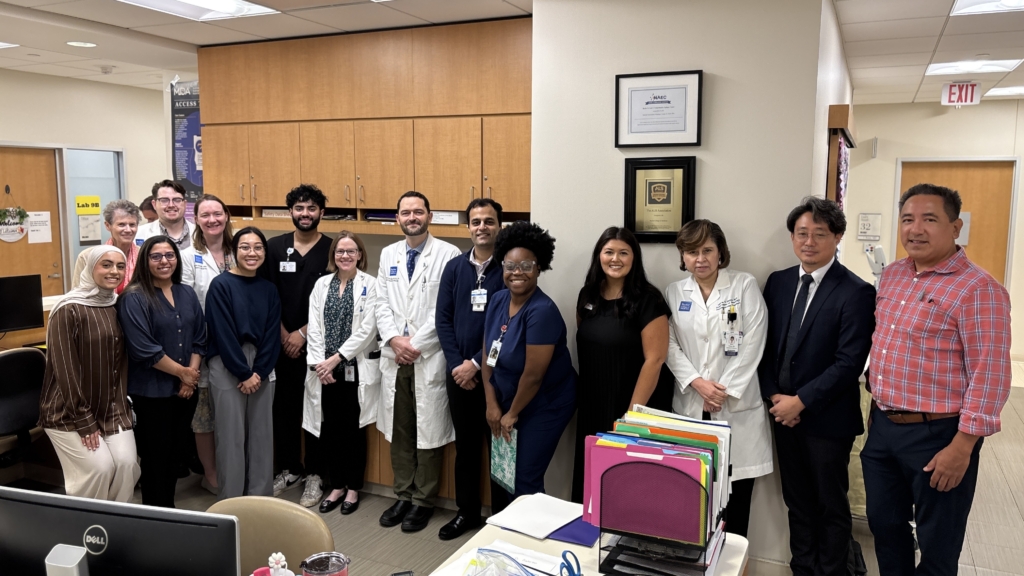
Baylor and ALS Association honor transformative 20-year partnership
In August 2025, the Baylor College of Medicine’s Amyotrophic Lateral Sclerosis (ALS) Multidisciplinary Clinic celebrated its 20th anniversary—two decades of compassionate care, groundbreaking research and a transformative partnership with the ALS Association in the fight to cure this disease. Founded in 2005 by Yadollah Harati, M.D., professor of Neurology at Baylor, the Clinic was one of the first in the nation to adopt a fully multidisciplinary model, bringing together specialists across neurology, pulmonology, speech therapy, nutrition and palliative care to provide holistic, patient-centered ALS care.
Amyotrophic lateral sclerosis, also known as Lou Gehrig’s disease, is a progressive neurodegenerative disease that causes muscle weakness, loss of motor control and eventual paralysis, and which typically affects individuals ages 40 to 75. As symptoms worsen, even routine medical appointments become difficult for patients and caregivers. Baylor’s “one-stop- shop” model allows patients to stay in one room while a rotating team of experts delivers seamless, comprehensive care, minimizing physical strain and improving clinical outcomes.
Today, the Clinic operates two half-days per month and continues to grow to meet patient demand. In the past year, it served over 90 patients and was among the first in Texas to administer tofersen, a genetic therapy for SOD1-related ALS that slows disease progression and improves mobility.
“It’s been fantastic seeing our experts come together to provide cutting-edge therapy and care for our patients,” said Sarah Berth, M.D., Ph.D., director of the ALS Multidisciplinary Clinic and assistant professor of Neurology at Baylor. “Being part of such a large, collaborative team has been incredibly rewarding.”
Central to Baylor’s success is its partnership with the ALS Association, a nonprofit that funds global ALS research, provides care services and advocates for state and federal policies serving ALS patients. The Association also provides patients with access to a robust Care Services Team, which helps patients and caregivers navigate the challenges of living with ALS, from emotional support to insurance policies to home safety and accessibility to securing financial support for equipment. The ALS Association designated the Clinic a Certified Treatment Center of Excellence in 2007, and an Association representative is present to assist patients and caregivers during Baylor’s Clinic days.
Its philanthropic support has also advanced Baylor’s research, including the establishment of the ALS Clinical Trials Unit, led by Dr. Berth, which gives patients access to promising therapies. The Clinic contributes to international efforts like the Target ALS Biofluid Consortium, which collects biological samples to accelerate therapeutic development, and conducts original research supported by the Association.
“From its philanthropic contributions to having a representative in the Clinic, we’re very grateful for the Association’s support,” said Dr. Berth. “It’s been integral to our growth.”
As the Clinic enters its third decade, its mission remains clear: deliver expert, compassionate care while advancing ALS research. With continued support from the ALS Association, the Clinic aims to increase clinical trial participation and ensure that every patient and family receives the resources they need. Together, Baylor and the ALS Association are forging a future where ALS is not only treatable but, ultimately, curable.
“We work with the best physicians in the world, and Baylor’s are certainly at the top of that list,” said Tonya Hitschmann, managing director of Care Services for the ALS Association. “We remain tremendously grateful to do this work alongside Baylor College of Medicine.”
To learn more about the ALS Multidisciplinary Clinic, click here.


